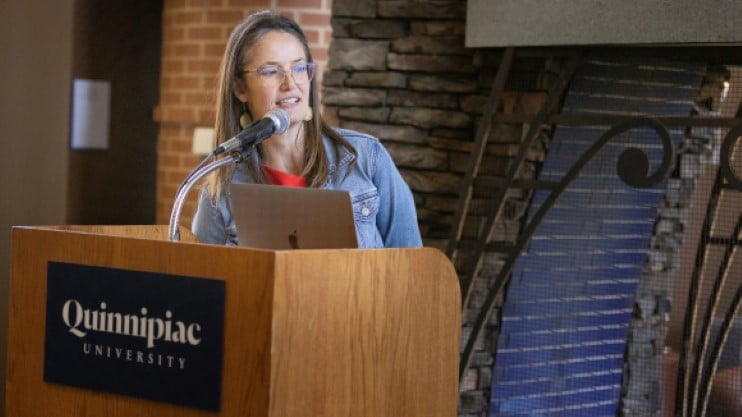
Quinnipiac teach-in promotes community support of Indigenous culture
November 10, 2022

November 10, 2022

The event featured 12 speakers consisting of students, faculty, and staff.
Among the highlights:
Christina Dickerson, assistant professor of history, spoke about the tribal nations of Quinnetukut.
She discussed the five tribal nations that Connecticut recognizes, two of which are identified federally —the Mohegan and Mashantucket Pequot. She said the university community has a responsibility to support Indigenous history and peoples.
Caitlin Hanlon, assistant professor of biology, discussed the increase of ancestry tests for identifying individuals’ Indigenous identities.
“Several DNA tests on the market claim to test solely for Indigenous DNA and use imagery of ‘the proud Indian warrior’ in their marketing,” she said. “There’s no such thing as a ‘correct’ ancestry DNA test: The reports from these tests change based on the number of variants analyzed, the size of the reference population, and proprietary algorithms.”
She added that all humans have DNA; there are no particular DNA variants that are unique for any group of people.
“Not understanding the nuances of DNA testing can also lead to increases in racial essentialism, or the idea that races are fundamentally different,” Hanlon said.
Aiyana Baker and Amada Arroyo, Indigenous Student Union executive board members, urged students to educate themselves on their cultures and backgrounds.
Daniel Galvet, a Quinnipiac student who is currently enrolled in an anthropology course, urged the community to educate themselves on Indigenous history, particularly given the name of the university.
Julia Giblin, professor of anthropology, said most of what we know about the Quinnipiac people and their ancestors come from historical sources, such as early colonial documents.
“There has been very little archaeological research in the Quinnipiac River Valley, however, it has been a popular location for artifact hunting and collecting for the past 400 years,” she said. “Thousands of artifacts from this region now exist at various institutions around the state, such as the North Haven Historical Society and the Institute for American Indian Studies.”
She is collaborating with people from both of these organizations as well as the state and federally recognized tribes to develop a plan for what to do with these legacy collections to better honor and stewart the Indigenous culture in the region.
Don Sawyer, vice president for equity, inclusion, and leadership development, and associate professor of sociology, highlighted a few Indigenous music creators.
Marcos Scauso, assistant professor of political science, highlighted the important Indigenous writer Fausto Reynaga and his philosophy.
“The problem is when a particular heritage and identity becomes dominant and universalizes itself above all other ways of being. This creates issues of racism and oppression,” he said. “Fausto Reynaga points out that these issues have been taking place for centuries and still happen today under the form of neoliberalism, an ideology that thinks that the only identity of ‘humanity’ is that of profit-seeking and consumerism.”
He said it makes us think critically about how we assume — even in education — that consumerism, market-based demand, profit-seeking, and the voices of corporations are everything.
“This creates racist and colonial biases against Indigenous knowledge, environmentalist discussions, critical approaches, decolonial notions, and many other ways of knowing, being, feeling, and enacting other worlds,” he said.
Hillary Haldane, professor of anthropology, provided examples of how FIFA is marketing Indigenous Māori people's culture.
“While the WWC 2023 is using Indigenous symbolism and cultural presentations, the question is whether this will translate into substance where Indigenous people's lives in Aotearoa and Australia will be improved as a result of this tournament,” she said. “The U.S., Canada, and Mexico host the men's senior tournament in 2026. All three countries host hundreds of Indigenous nations and territories. Will the 2026 tournament also use Indigenous languages, cultures, and symbolism, or was the WWC 2023 a one-and-done?”
Luis Arata, professor of modern languages, talked about Popol Vuh possibly being the first hieroglyphic codex.
Emily Diaz, a Quinnipiac student, touched on the Mapuche resistance and the decolonizing histories of gender.
Quinnipiac Today is your source for what's happening throughout #BobcatNation. Sign up for our weekly email newsletter to be among the first to know about news, events and members of our Bobcat family who are making a positive difference in our world.
Sign Up Now